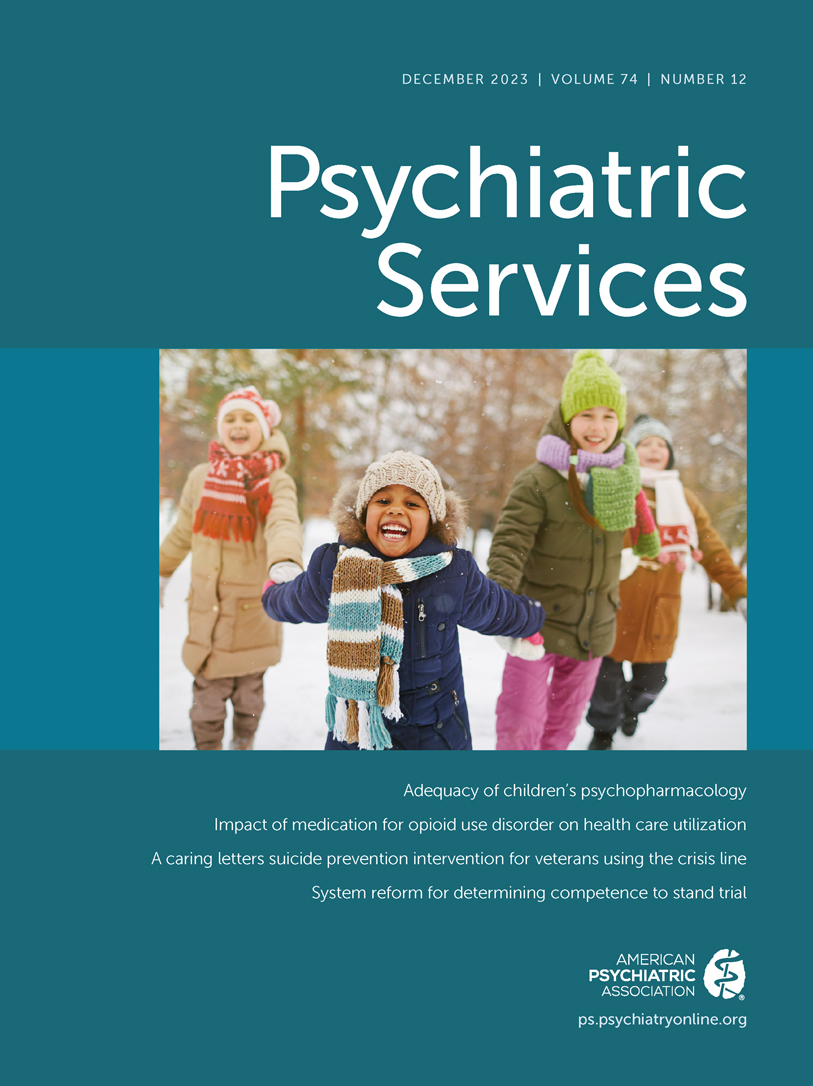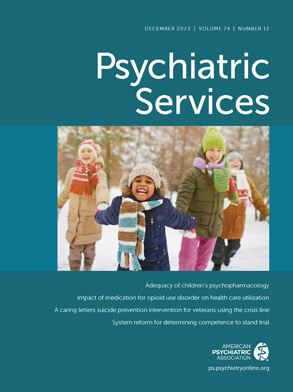Investigations by Compton and colleagues (
1,
2) demonstrate an astounding rate of arrests among individuals with serious mental illness and those receiving inpatient psychiatric care. Findings from one of the studies (
1) showed that approximately 71% of individuals with psychotic or mood disorders who received treatment at one of three inpatient psychiatric facilities in Georgia between 2014 and 2018 had at least one arrest. Arrests for low-level and misdemeanor crimes are particularly common among individuals with certain behavioral health conditions, namely, psychotic and major mood disorders. These arrests are associated with disadvantaged socioeconomic status and lowered quality of life. Compton et al. (
2), using an epidemiological approach, combined enormous data sets, drawn from state-level Medicaid and law enforcement records, to examine this marginalized population’s criminal legal involvement. Disproportionate and reoccurring arrest—misdemeanor arrest in particular—among those with serious mental illness is a driving force behind the national competence to stand trial (CST) crisis, a challenge that demands better research attention. Although Compton et al. (
1,
2) do not directly address the CST crisis, this commentary describes how Compton and others’ findings can inform solutions to an urgent problem facing the public mental health system.
CST is a constitutional protection intended to uphold the due process rights of criminal defendants and the dignity of the legal process. It requires that defendants have a rational and factual understanding of the proceedings against them and can assist counsel in their defense. The CST crisis is embedded in both evaluation and restoration of CST, in which defendants opined incompetent to stand trial (IST) typically receive education and psychiatric medication intended to manage underlying conditions (usually psychosis) that render them IST. Historically, restoration of CST occurred only on an inpatient basis, although jail-based and community-based restoration programs are emerging in response to the recent crisis.
Courts have ordered CST evaluations at an unprecedented rate over the past two decades. An exact number is unavailable, but recent annual estimates suggest 130,000 evaluations. A consequence of increasing court-ordered evaluations is an increased number of defendants ordered to undergo inpatient restoration, even if IST rates stay stable. But remarkably, the
proportion of defendants found to be IST—not just the large number—also appears to be increasing in every state that tracks these data (
3).
Overall, findings of dramatically increased IST rates are challenging states to create additional CST restoration capacity. Despite drastically reduced bed capacity in state hospitals, the U.S. inpatient IST population has increased more than 70% (
4). Thousands of defendants found to be IST reside in underresourced jails while awaiting inpatient restoration for months or even years; at least 16 states have faced legal action for their IST waitlists (
4). Meanwhile, defendants in jail who are awaiting court-ordered treatment endure deteriorating mental health, and state mental health authorities pay millions of dollars in fines for failing to provide timely and adequate treatment (
4). This crisis is cyclical; as hospitals scramble to accept these increasing forensic (i.e., IST) admissions, they reduce civil capacity, which leaves potential patients with less access to inpatient treatment until they are arrested.
Studies such as Compton et al.’s (
2), detailing misdemeanor arrests among those with mental illness, inform our understanding and help advance steps toward reforming the competency crisis. These studies complement evidence from forensic psychology that those arrested for misdemeanors and minor offenses are more likely to manifest psychosis and be found incompetent in CST evaluations. A study of CST evaluations in Virginia (
3) found that defendants facing only misdemeanor charges were much more likely to be found IST (likely because these defendants were twice as likely to manifest symptoms of psychosis) and ultimately cost the state much more in providing restoration services. Likewise, a Nashville study of defendants charged with misdemeanors and ordered to undergo CST evaluation found that 70% were opined IST, and they were ultimately more likely to be rearrested after their charges had resolved (
5). The study’s findings “support the criminalization hypothesis, suggesting that criminal justice involvement for this subset of defendants inappropriately reflects psychiatric instability.”
Taken together, Compton et al. (
1,
2) and others underscore the plight of many persons with serious mental illness (and often without housing), who ultimately receive psychiatric treatment only through the cumbersome CST restoration process. But they also highlight that social service and criminal legal systems have the power to mitigate risk for arrest and incarceration among individuals with mental illness. This research suggests big-picture solutions for tempering the CST crisis. These solutions include improving interventions “upstream,” that is, before arrest, such as enhancing crisis intervention services, training police on crisis deescalation, and establishing protocols for mental health providers for when to call police and when other approaches may be more appropriate (
6).
Once people with mental illness are arrested, alternatives to inpatient restoration include diversion to acute inpatient units, diversion to community programs, and early enhanced psychiatric treatment for those in jail. Other recommendations include coordination and monitoring through specialized competency dockets and training judges and forensic evaluators on alternatives to inpatient treatment. Individuals referred to inpatient restoration (or ultimately discharged from jail) have a need for referrals and coordination with community providers to avoid the common occurrence of individuals being restored to competence only to decompensate because of inadequate resources in the community. Some states (e.g., California and Florida) limit inpatient restoration only to felonies, not misdemeanors, but attempt to divert those facing misdemeanor charges to other treatments. When laws cannot be changed in that manner, other options include creating financial incentives for counties to prioritize diversion over restoration and giving state authorities control over initial community competency assessments.
We encourage addressing the CST crisis from a public health perspective, combining rigorous research like that of Compton and colleagues with competence-specific studies such as those in forensic psychology. Unlike social epidemiological research that assesses relationships between criminal legal involvement and mental illness, the CST research often published in forensic journals is not yet known for impressive or even reliable cross-system data infrastructure or robust quasi-experimental statistical techniques.
Findings published in this journal have revealed strong links between social determinants of health and the longstanding overrepresentation of individuals with mental illness in U.S. jails and prisons. The findings shed light on why jails have become the nation’s largest de facto behavioral health care system. If this genre of social epidemiological research could extend a few steps further, it could also shed light on how targeted policy efforts, such as diverting persons with mental illness cited for minor “quality-of-life offenses” (e.g., trespassing and loitering), affect competency evaluation referrals, restoration demands, and recidivism risks. We urge public health and forensic researchers to join in these efforts and address related goals: to reduce criminal legal contact for people with mental illness and to resolve the CTS crisis.

